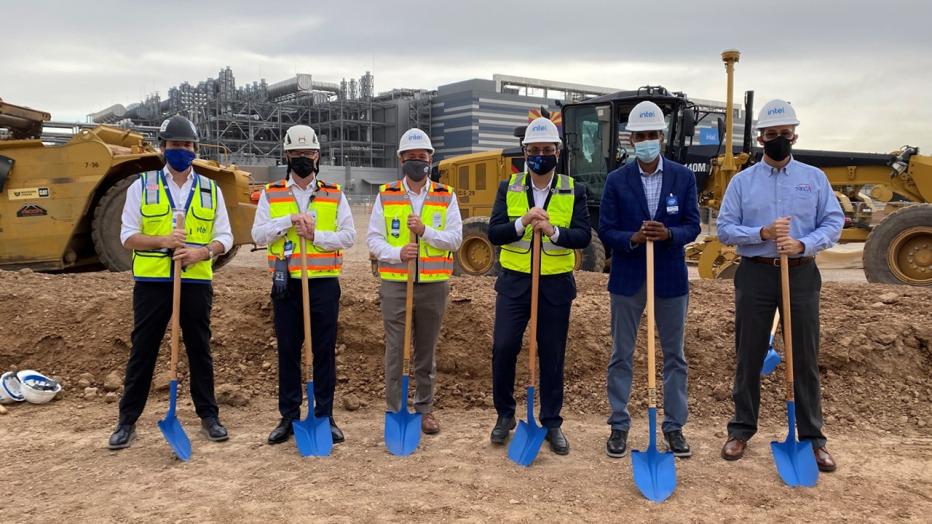
Jacobs is helping Intel solve one of the world’s most critical issues—the global semiconductor shortage.
The COVID-19 pandemic and ever-increasing digitization have disrupted the global semiconductor supply chain and led to a dire shortage of microchips. As industries from healthcare to transportation increasingly rely on computers and the chips that power them, chip manufacturers like Intel are stepping up to boost capacity and meet global demand.
The challenge: funding, designing and building the fabrication facilities (or fabs) that manufacture chips is a technically complex, expensive process that generally takes up to five years.
By making fab engineering more cost effective, reliable and repeatable, Jacobs is supporting Intel’s goals to increase domestic chipmaking capacity, end the semiconductor shortage, meet global demand and create a more balanced, resilient global supply chain.
Breaking ground
Intel’s latest project, the construction of two new fabs located on its Ocotillo campus in Chandler, Arizona, broke ground in September.
The project is part of a $20 billion USD investment in capacity expansion for manufacturing of microchips that power the world’s laptops, smartphones and every electronic or computer-based device in between.
The project comprises two modules or fabs together spanning 4.8 million square feet, each technically complex and home to Intel’s latest processing technologies. Jacobs is engineering the fabs and has developed a design concept to match Intel’s next-generation manufacturing technology. To date, Jacobs has completed site master planning and concept and is currently supporting programming and early construction packages.
Challenge and solution
Intel’s mission to meet global chip demand is no small challenge. The company is undertaking projects at a significantly faster pace than prior years. Efficiency, cost-effectiveness and speed to market are critical.
Jacobs’ solutions will help Intel meet this challenge. Solutions our teams have brought to the project include:
- To stay on the critical path for construction, the Jacobs project team accelerated the release of early design packages, ensuring a smooth launch to the construction of the project.
- To meet Intel’s schedule, Jacobs leverages a technical bench of people from 15 offices stateside and around the world, including in Arizona and Texas; Portland, Oregon; Greenville, South Carolina; Cincinnati, Ohio; Krakow, Poland and others across globe.
- Working across offices requires flawless execution—digital tools like vPlanner help coordinate multi-step processes to generate reliable commitments between Jacobs teams and to seamlessly meet deadlines and reach end goals.
- To outpace local trade and supply chain constraints, Jacobs designs components for off-site fabrication, local delivery and installation, leveling workload and resourcing across the supply chain.
- The Jacobs team has developed new building information modeling (BIM) design content replication methods (copy, mirroring, automated modification of design content to reflect the patterns required from building to building and site to site). This method is applicable to a wide range of Jacobs’ projects.
Fabs are expensive and incredibly complex facilities, but Jacobs’ state-of-the-art design efficiency and speed of delivery are helping Intel achieve its project timeline.
What this means for Arizona, the United States and the world
The $20 billion investment in Arizona is the largest private investment in state history. In addition to this historic investment, Intel estimates the project will create 3,000 high-tech, high-wage jobs; 3,000 construction jobs; and will support an estimated 15,000 additional indirect jobs in the local community.
But the project’s impact extends far beyond Arizona and the near-term.
With Intel’s Arizona expansion and other announced planned investments, the U.S. will be home to increased semiconductor manufacturing capacity over the coming years. By helping build capacity in the U.S., Jacobs is contributing to a more stable, balanced and resilient semiconductor supply chain.
When complete, the project will expand Intel’s global capacity, allowing it to ramp up production to close the shortfall in chips globally and increase the competitiveness of the U.S. technology sector.
However, in an era of digitization, the work does not stop there: as industries increasingly rely on computers and artificial intelligence, as transportation electrifies and cars become computers, and as millions more global consumers gain access to the internet, smartphones and laptops, demand for chips will only increase.

By helping Intel quickly increase domestic production and increase resiliency of the global supply chain, Jacobs is doing its part to challenge today and reinvent tomorrow.
“We are pleased to support Intel as they embark upon an aggressive effort to significantly expand their manufacturing capacity and address the global chip shortage,” said Jacobs Chief Operating Officer Bob Pragada. “Breaking ground on this incredible program was a great privilege and commemoration of the tireless efforts of Intel and our delivery partners.”
Jacobs has supported Intel since the 1980s and has often served as a key partner to design its fabs. Sharing with Intel a spirit of continuous improvement and learning, the Jacobs project team is applying lessons learned from its history of work with the client to the new project.
The new fabs are scheduled to be fully operational in 2024. The groundbreaking ceremony took place on September 24, 2021.
You might be interested in...
Engineering News-Record: With World Short of Chips, Intel Plans to Spend Billions on Manufacturing
Engineering News-Record: Intel's $20B 'Mega-Site' Is Latest Effort to Boost US Chip-Making












































